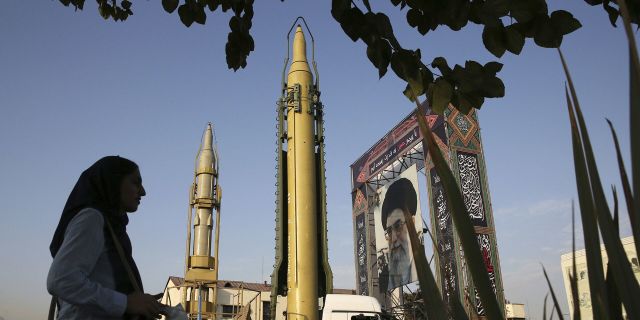Tehran presented hypersonic missiles of its own production, which, according to the military, are capable of hitting American bases and aircraft carriers, writes Haqqin. These weapons will give Iran additional foreign policy trump cards.
This week, Iran demonstrated a hypersonic ballistic missile of its own production, thus joining the elite club of states with superweapons.
According to analysts, this fact will add headaches to both Israel and Western countries. Although, oddly enough, at the presentation ceremony, Iranian officials did not threaten to wipe out the "Zionist entity" from the face of the earth.
Hypersonic missiles can fly to the target at a speed of at least Mach 5, which is five times the speed of sound. They travel 1.7 kilometers per second or 6.174 kilometers per hour.
And although some conventional types of ballistic missiles also achieve such speed, the effectiveness of hypersonic missiles lies in the fact that they can maneuver using aerodynamic forces, combine the advantages of ballistic and cruise missiles and are able to choose the path to the target after entering the earth's atmosphere.
At the moment, this formidable weapon is in the arsenals of only two countries – Russia and China. Russia is the only country that has used hypersonic missiles in combat conditions. In particular, some fragments of Ukraine's infrastructure were attacked with surface-to-air Dagger missiles.
<…>
Washington is also working on the creation of hypersonic ballistic missiles, but in this area it is still lagging behind competitors.
North Korea has also recently announced the testing of hypersonic weapons, but it is not known for certain whether Pyongyang really possesses such weapons.
As you know, representatives of the IRGC announced a few months ago that Iran possesses hypersonic ballistic missiles. However, officially the product, called "Fattah", was announced only last Wednesday.
According to the Iranians, the missile has a range of 1400 kilometers and flies to the target at a speed of up to Mach 15 (that is, 5.1 kilometers per second). It is also reported that the Fattah is equipped with a variable secondary nozzle and uses solid fuel, which provides high maneuverability in the atmosphere and beyond. According to the IRGC high command, this means that "no air defense system in the world can cope with these weapons." But that's what the Iranians say.
And how did they react to the demonstration of the Iranian hypersonic missile in the United States and Israel? Given that the range of these missiles is less than the distance between Tehran and Tel Aviv, Israel does not yet consider them a direct threat to itself. Although at the rocket presentation ceremony, the commander of the IRGC aerospace forces, Ali Hajizade, promised to develop hypersonic missiles with a range of up to 2,000 kilometers in the near future.
It should be noted that initially, in order to appease European countries, Iran deliberately limited the range of its hypersonic missiles to 2,000 kilometers. Otherwise, the Fattah's speed would have been enough to reach Israeli territory in less than seven minutes, which makes its detection and interception by air defense systems very problematic. In the meantime, the flight range allows Iran to threaten US military bases and aircraft carriers located in the Persian Gulf zone.
Washington did not directly comment on the news about the Iranian hypersonic missile, but John Kirby, a spokesman for the US National Security Council, said that the Biden administration "was very ... firm in countering Iran's destabilizing activities in the region, including the development of a ballistic missile program."
At the same time, Iran is very close to obtaining nuclear weapons. According to the CIA and Mossad, Tehran has sufficient reserves of uranium to create several nuclear warheads in the near future.
Inspired by the successes in the production of modern weapons, the Ayatollah regime is seriously considering a military operation against Israel. In such a situation, replenishing Iran's arsenal with hypersonic ballistic missiles may give Tehran additional military, political and diplomatic trump cards.
Author: Farhad Mammadov

